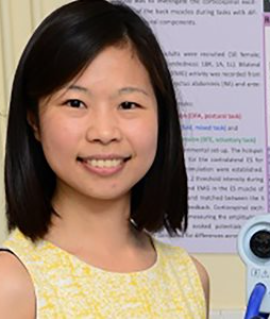Title : The effects of arm exercise on trunk function in individuals with spinal cord injury
Abstract:
Abstract: Short Description of what will be discussed during the presentation
Objectives: Many people living with spinal cord injury (SCI) exhibit reduced trunk control which can severely compromise the use of upper and lower extremities, hindering functional recovery. Current rehabilitation for improving trunk function remains complex and time-consuming, highlighting a need to develop new rehabilitation interventions that are simple and low-cost. It is well accepted that increasing the excitability of neural pathways can improve function of that muscle in patients with neurological disorders. Numerous studies have reported a voluntary contraction of muscles with one arm increasing corticospinal excitability of the contralateral resting arm, a phenomenon known as crossed facilitation. We previously showed that voluntary contractions of upper-limb muscles facilitated corticospinal excitability of trunk muscles in healthy adults and in adults with SCI. However, it remains unclear the therapeutic effects of arm exercise on trunk function in individuals with SCI. Hence, the study aimed to investigate the effects of a six-week, home-based, arm crank exercise programme on motor control of the trunk in individuals with chronic SCI.
Methods: Participants with chronic, incomplete cervical or high thoracic SCI patients (mean age?SD: 53?15 years; cervical SCI; 9) undertook a home-based arm crank exercise programme. The programme consisted of 30 minutes of exercise for five consecutive days, for six weeks. Corticospinal excitability of erector spinae (ES) muscles were assessed prior to and following the exercise programme using transcranial magnetic stimulation (TMS). Motor evoked potentials (MEPs) of the ES induced by TMS were recorded using electromyography (EMG). Neuromuscular control of the ES muscles was evaluated using high-density surface EMG (HDsEMG) during multidirectional reaching tasks. Amplitudes of the activity and entropy were analysed. Reaching distance, trunk displacement, and centre of pressure were recorded using a 3-D motion capture system and a force plate.
Results: We found amplitudes of ES MEPs increased 50%, 25% and 35% with respect to the baseline after 10, 20, and 30 minutes post exercise. After 6 weeks of the intervention, activity of the bilateral ES muscles during the reaching tasks also increased, suggesting an improvement in volitional control of the ES muscles. In addition, there was an increase in entropy in the bilateral ES muscles compared to baseline during reaching, suggesting improved efficiency and spatial homogeneity of muscle recruitment. There was also improvement in reaching distance, indicating improved dynamic sitting balance after the intervention.
5th Edition of International Conference on Neurology And Neurological Disorders| June 15 -16, 2022 | Rome, Italy
Conclusions: We demonstrated that a six-week, home-based arm crank exercise programme can improve trunk function in people with chronic, incomplete SCI. Our findings provide a simple and affordable rehabilitation method for restoring trunk function after SCI.
What will audience learn from your presentation?
The concept of crossed facilitation or crossed education and its clinical application in rehabilitation.
- Methodology of neurophysiology in humans in providing objective measurements for quantifying the effects of rehabilitation
- The intervention discussed in this presentation is simple and affordable, increasing the accessibility of equipment to patients
- The intervention discussed in this presentation is patient-initiated exercise and does not increase workload of healthcare professionals, providing patients an option that may help them recover




